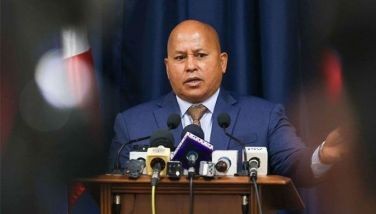Electricity to cost 56¢ per kwh more next year — solon
August 14, 2001 | 12:00am
Warning to consumers: your electricity will cost 56 centavos more per kilowatt-hour next year.
Rep. Joey Salceda (Lakas, Albay), incoming chairman of the House oversight committee, aired the warning yesterday based on the financial projections of the state-owned National Power Corp. (Napocor).
The projections form part of the four-inch thick budget proposal of President Arroyo for 2002.
Salceda said Napocor is projecting a power rate increase of 18 percent, from P3.12 per kilowatt-hour to P3.68 per kwh, effective next year.
He said Napocor is telling "a radically different story about the impact of the Electricity Reform Act (Republic Act 9136)."
He said the state power firm’s projection is contrary to the "much-ballyhooed pronouncement of a rate cut."
RA 9136 is supposed to restructure the electricity industry by, among other things, authorizing the sale of Napocor. To make the firm attractive to potential buyers, the law transferred its indebtedness to the national government and consumers.
The government is to assume up to P250 billion of Napocor loans, while consumers are to pay for about P200 billion in the form of a universal levy added to their monthly electric consumption bills.
According to Salceda, taxpayers will start paying for the P250 billion assumed loans next year.
He also said based on Napocor’s financial projections, its losses will soar to P34.2 billion in 2001 from P16.3 billion this year.
"Such losses are difficult to accept given the hefty PPA (purchased power adjustment) consumers are already paying," he said.
The former hotshot financial and stock market analyst traced the losses to two sources: the "onerous" IPP (independent power producer) contracts worth P450 billion, and Napocor’s overhead expenses that would reach P102 billion.
The IPP contracts were negotiated during the Ramos administration when the country was experiencing an energy crisis. Investors were asked to build power plants in exchange for guaranteed payment for power, even if such supply is not used when demand is low.
One IPP, Southern Energy, which is owned by a Hong Kong businessman, earned P22 billion last year together with two subsidiaries. It was the country’s top money earner, dislodging the state-owned gambling agency, Philippine Amusement and Gaming Corp., and food-beverage giant San Miguel Corp.
Seen against the backdrop of Southern Energy emerging from nowhere to become the country’s most profitable corporation, Napocor’s losses leave the government no option but to renegotiate the IPP contracts, Salceda said.
He said the administration owes it to Filipino consumers and taxpayers to work for the revision of the contracts and for favorable terms.
There was another item in the Napocor document that caught the attention of the eagle-eyed Albay congressman.
He said he was surprised by the state power firm’s estimate of a sales volume growth of only .46 percent "versus the underlying budget assumption of 4.5 percent GDP (gross domestic product) growth for 2002."
He said since power consumption historically serves as a gauge of economic activity, Napocor’s estimate means that economic growth will be "simply close to zero percent."
Rep. Joey Salceda (Lakas, Albay), incoming chairman of the House oversight committee, aired the warning yesterday based on the financial projections of the state-owned National Power Corp. (Napocor).
The projections form part of the four-inch thick budget proposal of President Arroyo for 2002.
Salceda said Napocor is projecting a power rate increase of 18 percent, from P3.12 per kilowatt-hour to P3.68 per kwh, effective next year.
He said Napocor is telling "a radically different story about the impact of the Electricity Reform Act (Republic Act 9136)."
He said the state power firm’s projection is contrary to the "much-ballyhooed pronouncement of a rate cut."
RA 9136 is supposed to restructure the electricity industry by, among other things, authorizing the sale of Napocor. To make the firm attractive to potential buyers, the law transferred its indebtedness to the national government and consumers.
The government is to assume up to P250 billion of Napocor loans, while consumers are to pay for about P200 billion in the form of a universal levy added to their monthly electric consumption bills.
According to Salceda, taxpayers will start paying for the P250 billion assumed loans next year.
He also said based on Napocor’s financial projections, its losses will soar to P34.2 billion in 2001 from P16.3 billion this year.
"Such losses are difficult to accept given the hefty PPA (purchased power adjustment) consumers are already paying," he said.
The former hotshot financial and stock market analyst traced the losses to two sources: the "onerous" IPP (independent power producer) contracts worth P450 billion, and Napocor’s overhead expenses that would reach P102 billion.
The IPP contracts were negotiated during the Ramos administration when the country was experiencing an energy crisis. Investors were asked to build power plants in exchange for guaranteed payment for power, even if such supply is not used when demand is low.
One IPP, Southern Energy, which is owned by a Hong Kong businessman, earned P22 billion last year together with two subsidiaries. It was the country’s top money earner, dislodging the state-owned gambling agency, Philippine Amusement and Gaming Corp., and food-beverage giant San Miguel Corp.
Seen against the backdrop of Southern Energy emerging from nowhere to become the country’s most profitable corporation, Napocor’s losses leave the government no option but to renegotiate the IPP contracts, Salceda said.
He said the administration owes it to Filipino consumers and taxpayers to work for the revision of the contracts and for favorable terms.
There was another item in the Napocor document that caught the attention of the eagle-eyed Albay congressman.
He said he was surprised by the state power firm’s estimate of a sales volume growth of only .46 percent "versus the underlying budget assumption of 4.5 percent GDP (gross domestic product) growth for 2002."
He said since power consumption historically serves as a gauge of economic activity, Napocor’s estimate means that economic growth will be "simply close to zero percent."
BrandSpace Articles
<
>
- Latest
- Trending
Trending
Latest
Trending
Latest
Recommended


































